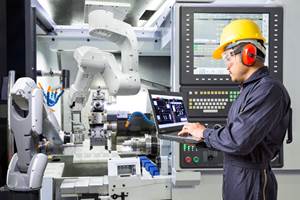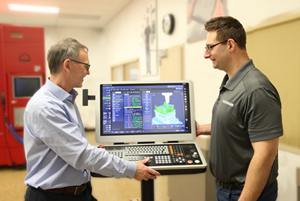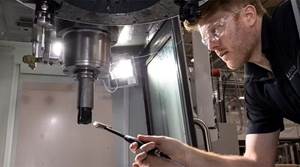Shop Control Software Helps Job Shop Make The Right Moves
By replacing its haphazard, error-prone shop control system with the E2 Shop System ERP solution from ShopTech Industrial Software, this contract manufacturer reduced waste and improved efficiency in virtually every department.
Share




Karen Raush has had many roles at Collins Machine & Manufacturing in Louisville, Colorado. Her current title is quality manager, but she has been a prototype machinist, production supervisor and cost analyzer in her 12 years in the industry. She probably knows as much about the workings of this shop as anybody there, so she is in an especially good position to understand the importance of a computerized shop control system to the entire company.
Versatility and adaptability are two of the chief characteristics she values in the ERP (enterprise resource planning) software that drives a shop control system. "Our work ranges from prototype to production. Like many shops out there, we have a lot of changing demands and needs over the years," she says. The software that has been meeting this requirement for the past 6 years is the E2 Shop System from ShopTech (Glastonbury, Connecticut). "We have been able to implement E2 and adapt its use as our company evolves," Ms. Raush says. "Prior to the introduction of this software at Collins Machine, we had communication errors because we used different databases and software—none of which were linked together or interacted with one another—for different departments." Those errors have been eliminated because the modules in the current software interact and cover the needs for all departments, she says.
Collins has been in operation since 1973. It has about 45 employees. Although the company is a pure job shop that is willing to quote on a wide variety of challenging workpiece types and lot sizes, its primary focus in the last few years has been mostly aerospace and advanced defense-related prototype work. The shop is also involved in short-run production jobs. Its machining resources include a number of Fadal, Daewoo and Hurco VMCs, a Mazak Palletech system and lathes from EZPath and Okuma. Ms. Raush reports that the company has been busy throughout 2008 and expects to see healthy business in 2009 despite the economic downturn. In fact, the company recently moved to a new facility with three times the space of the previous site. Along with the move, the company plans to add 30 percent more machining capacity—all the more reason that an effective shop control system must be in place and able to grow with the company, Ms. Raush says.
Although her title is quality manager, meeting quality goals is such a pervasive responsibility for every employee at Collins that Ms. Raush often plays a role more like a production manager. The ability to view reports generated by various modules within the shop control software, such as Purchasing, Quoting, Shop Control and Quality, facilitates her broad involvement in overall production quality. "On a daily basis, one of my favorite single-screen overviews is the E2 Scheduling Advisor," she says. This screen allows her to see exactly what is going on in the shop without leaving her desk. In the longer term, she says, the software also helps set measurable improvement objectives for Collins Machine.
For example, the software is helping the shop work toward becoming a "greener" organization, particularly in regards to reducing paper consumption. "I believe many companies like Collins Machine want to find ways to lessen their environmental impact as well as extract the most value from their resources," Ms. Raush explains. With the shop control software, users can attach, import and export electronic documents while maintaining document and record control, thus eliminating hard copies that have to be mailed, distributed and filed.
"We can e-mail directly out of E2," she says. For example, in the Quoting module, responses to incoming RFQs can be e-mailed without cutting and pasting into another PC application or printing a hard copy to fax. Likewise, shop routers can be attached as electronic documents when an order is released to the shop floor. Similarly, corrective action memos can be attached to quality reports generated in the Quality module.
The company has also derived other efficiencies from this shop control software. "We have eliminated redundant data entry because the modules interact well with one another and self-populate in many scenarios," Ms. Raush says. Furthermore, by using the Quality module in conjunction with the system’s touchscreen reporting capability, Collins Machine can target areas for waste reduction. For example, when machinists close a job file, they are prompted to record a scrap count and enter a reason code for scrapping the parts. "We had an occasion where scrap had gone up on one particular shift, and ‘Tooling Failure’ had been recorded on a job that had previously been running well," Ms. Raush recalls. Checking on that job revealed that a relatively new employee had been using a different style of boring bar insert than was designated for the job. "We were then able to correct the problem, give the employee additional training in this area and add this note to the traveler in E2 to prevent any recurrence," she concludes.
The Purchasing module provides another example of how the software helps the company become "lean and green." "In this module, we have been working with the Vendor Analysis report. Given the rise in the costs and environmental impact of transportation, we are looking into purchasing locally whenever possible," Ms. Raush explains. "The system enables us to evaluate the vendor quality, delivery time and pricing so, in turn, we will have a product and service that are critical to Collins Machine," she says.
Looking ahead, Ms. Raush is confident that the software can grow and change with the company’s needs. "The E2 Shop System software along with the training and customer service support provided by ShopTech has helped Collins Machine & Manufacturing in our pursuit of continuous improvement," Ms. Raush concludes.
Related Content
6 Machine Shop Essentials to Stay Competitive
If you want to streamline production and be competitive in the industry, you will need far more than a standard three-axis CNC mill or two-axis CNC lathe and a few measuring tools.
Read MoreGenerating a Digital Twin in the CNC
New control technology captures critical data about a machining process and uses it to create a 3D graphical representation of the finished workpiece. This new type of digital twin helps relate machining results to machine performance, leading to better decisions on the shop floor.
Read MoreHow to Mitigate Chatter to Boost Machining Rates
There are usually better solutions to chatter than just reducing the feed rate. Through vibration analysis, the chatter problem can be solved, enabling much higher metal removal rates, better quality and longer tool life.
Read More4 Commonly Misapplied CNC Features
Misapplication of these important CNC features will result in wasted time, wasted or duplicated effort and/or wasted material.
Read MoreRead Next
Building Out a Foundation for Student Machinists
Autodesk and Haas have teamed up to produce an introductory course for students that covers the basics of CAD, CAM and CNC while providing them with a portfolio part.
Read More5 Rules of Thumb for Buying CNC Machine Tools
Use these tips to carefully plan your machine tool purchases and to avoid regretting your decision later.
Read MoreSetting Up the Building Blocks for a Digital Factory
Woodward Inc. spent over a year developing an API to connect machines to its digital factory. Caron Engineering’s MiConnect has cut most of this process while also granting the shop greater access to machine information.
Read More

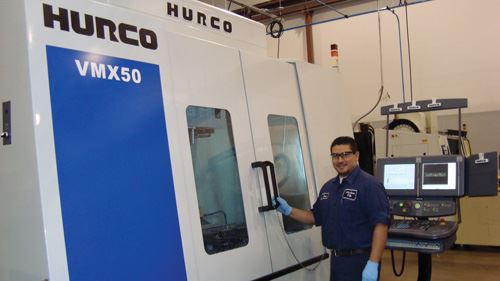
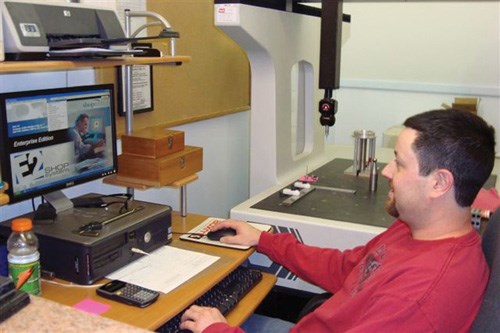
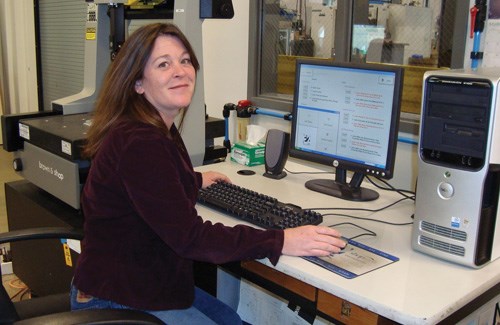



















.jpg;maxWidth=300;quality=90)







